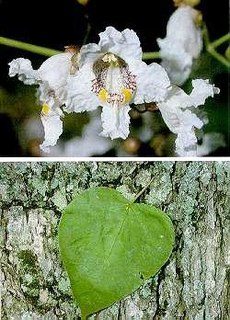
Fauquier is a county in the Commonwealth of Virginia. As of the 2010 census, the population was 65,203. The county seat is Warrenton.
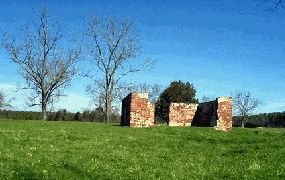
Green Spring Plantation in James City County about five miles (8 km) west of Williamsburg, was the 17th century plantation of one of the more popular governors of Colonial Virginia in North America, Sir William Berkeley, and his wife, Frances Culpeper Berkeley.
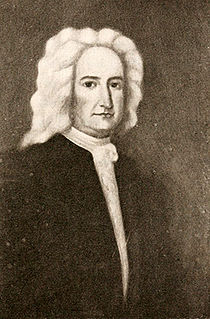
Philip Ludwell (1637/38—c.1716) of Rich Neck Plantation in James City County, Virginia was an American military and political figure, best known as governor of the British Colony of Carolina from 1691–94. From a base in the coastal port city of Charleston, he was governor of the entire Colony of Carolina.
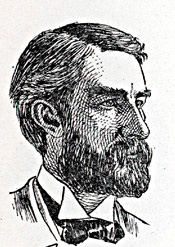
John Franklin Rixey was a Democratic U.S. Congressman from Virginia's 8th congressional district from 1897 to 1907.
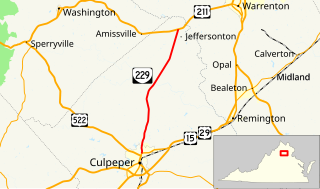
State Route 229 is a primary state highway in the U.S. state of Virginia. Known for most of its length as Rixeyville Road, the state highway runs 14.66 miles (23.59 km) from U.S. Route 15 Business and US 29 Business in Culpeper north to US 211 near Waterloo. SR 229 connects Culpeper with Catalpa and Rixeyville in northern Culpeper County.
John Williams Green was a Virginia lawyer, soldier, plantation owner, politician and judge. He fought in the War of 1812, was elected to the Virginia State Senate, and served for more than ten years as a judge on the Virginia Supreme Court of Appeals.
John Strode Barbour Sr. was a nineteenth-century politician and lawyer from Virginia. He was the father of John Strode Barbour Jr. and the first cousin of James Barbour and Philip Pendleton Barbour.
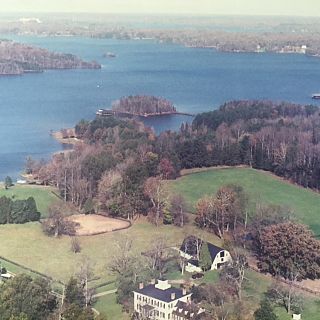
Jerdone Castle is a plantation located in Bumpass, Louisa County, Virginia originally established circa 1742. Jerdone Castle is a Virginia Historic Landmark and registered on the U.S. National Register of Historical Places. Originally 1,100 acres (450 ha), much of the plantation's original land is submerged under Lake Anna. The estate currently contains 125 acres (51 ha).
Thomas Barbour was a prominent landowner and member of the Virginia House of Burgesses.
James Barbour was a Virginia lawyer, planter, politician and Confederate officer. He represented Culpeper County, Virginia in the Virginia General Assembly, as well as in the Virginia Constitutional Convention of 1850 and the Virginia secession convention of 1861. Barbour also served among Virginia's delegates to the 1860 Democratic National Convention, and as a major in the Confederate States Army during the American Civil War.
The Barbour family is a prominent American political family of Scottish origin from Virginia. The progenitor of the Barbour family was James Barbour, who emigrated to Virginia from Scotland in the middle of the 17th-century.
John Strode Barbour was a Virginia lawyer, businessman, and politician.
Mordecai Barbour was a Culpeper County Militia officer during the American Revolutionary War and a prominent Virginia statesman, planter, and businessperson. Barbour was the father of John Strode Barbour, Sr., member of the U.S. House of Representatives from Virginia's 15th congressional district; and the grandfather of John Strode Barbour, Jr., member of the U.S. House of Representatives from Virginia's 8th congressional district and United States Senator; James Barbour, prominent Virginia statesman and planter; and Alfred Madison Barbour, Superintendent of the Harpers Ferry Armory during John Brown's raid.
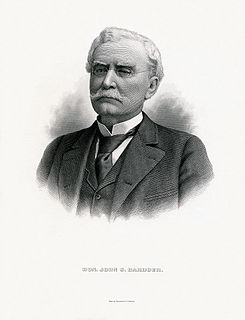
John Strode Barbour Jr. was a U.S. Representative and a Senator from Virginia. He is best remembered for taking power in Virginia from the short-lived Readjuster Party in the late 1880s, forming the first political machine of "Conservative Democrats", whose power was to last 80 years until the demise of the Byrd Organization in the late 1960s.
Jonathan Catlett Gibson was a nineteenth-century Virginia lawyer, farmer and Confederate soldier who represented Fauquier County in the Virginia Constitutional Convention of 1868 and later Culpeper County in the Virginia House of Delegates.
Perry Jackson Eggborn was a plantation owner, two-term member of the Virginia House of Delegates and judge in Culpeper County.





